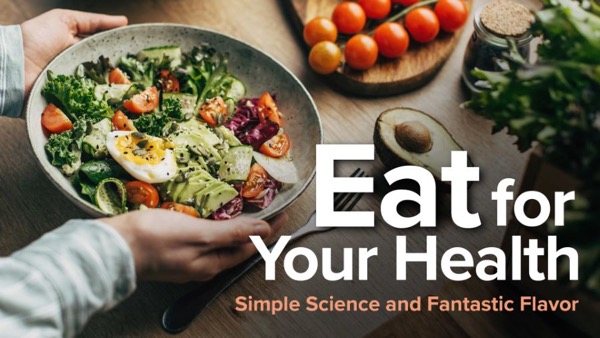In the 12 fascinating lessons of this program, Dr. Nordgren will bust the myths the food industry has been propagating, explain the truth about how nutrients work in the human body, and teach the basic cooking skills that will allow you to create healthy and delicious meals in your kitchen at home.
File Size: 5.641 GB.
Format File: 12 mp4 720p (MP4) + Guidebook (PDF).
The Great Courses – Julia Nordgren – Eat for Your Health: Simple Science and Fantastic Flavor (2024)


Julia Nordgren, MD
It is fascinating to peel back the layers of how food works in our body. The science of it is amazing. And food—I mean—really delicious food, can be the cornerstone of a healthy and fun life.
Institution: Stanford University
Alma mater: Dartmouth Geisel School of Medicine
Course Overview
The acronym of the Standard American Diet provides a pretty good description of what it does to our bodies and how it makes us feel: SAD. This is a calorie-dense, nutrient-poor diet that is rich in processed foods, chemical additives, preservatives, excess fats, and refined sugars. Scientific studies show it promotes inflammation, works against our microbiome, could be exacerbating mental illness and cognitive decline, and could certainly shorten our lives.
So why do we eat this way?
Because we believe healthy cooking at home would take too much time and effort and because an enormous food industry has stepped up to fill that void—selling us unhealthy foods that play right into our desire for convenience.
Enter Dr. Julia Nordgren, pediatrician and graduate of The Culinary Institute of America. In the 12 fascinating lessons of Eat for Your Health: Simple Science and Fantastic Flavor, Dr. Nordgren will bust the myths the food industry has been propagating, explain the truth about how nutrients work in the human body, and teach the basic cooking skills that will allow you to create healthy and delicious meals in your kitchen at home.
You will learn how Dr. Nordgren organizes her own busy life and her kitchen to make sure she can create quick, nutrient-dense, fun meals for herself and her family. By watching Dr. Nordgren prep and cook everything from shrimp tacos to stovetop popcorn, you’ll develop the confidence you need to create your own flavorful, nutritious meals. Your body will thank you—as will anyone who is lucky enough to share your meals.
Nutritional Myths and Misinformation
Information about nutrition comes at us every day from all sides. Signs in the “health food” store down the street want you to buy their brand of protein powder. You can’t build muscles without it! You should drink this brand of smoothie to strengthen your immune system and buy that one to drop pounds. “Energy” bars and drinks are everywhere—from grocery stores to gas stations.
Based on the opinion of a social-media influencer or a few magazine articles with punchy headlines—which might not be based on any scientific information—consumers change their eating habits, jumping on the latest fad. We often fill our pantries with snacks and meals sold to us by someone with no nutritional knowledge.
In this course, Dr. Nordgren will bust many of the most common nutritional myths, including:
- Go Low Fat Or No Fat. For almost 50 years, Americans have heard the message that dietary fat is bad, so we removed as much fat from our diet as we could. But we replaced fat with … excessive sugars. A much healthier option would have been switching from saturated to unsaturated fats. Mono- and poly-unsaturated fats can help increase the good cholesterol circulating in your system, which in turn can help remove the bad cholesterol.
- Vegetables Don’t Supply Protein. In the past few years, protein has become the celebrated macronutrient that we’re told we need to pile on. The truth is that any proteins you eat are broken down during digestion into proteins’ building blocks—amino acids. When your body needs a particular type of protein, it goes to the pool of amino acids and puts together exactly what it needs. Your best bet is to eat a wide variety of whole foods to build up your amino acid options—and that, definitely, includes vegetables, wonderful sources of proteins. You don’t need to buy giant containers of protein powder. Your miraculous body can make them.
- All Calories Are Equal. We have been trained, over and over again, to count our calories. Want to lose weight? Count calories. Want to feel healthier? Count calories. But it’s just not true. For the past 30 years, the most prestigious scientific journals have published studies showing that different meals with the exact same calorie content can have very different effects on our bodies. If you want to feel your best—and even lose weight—eat the widest possible variety of whole foods. That’s the ticket.
The Crucial How-Tos
Even with access to the most scientifically sound dietary advice, many of us still don’t know what to do. The idea of eating nutritious meals often feels like a chore we can’t possibly squeeze into an already busy schedule.
That’s where Eat for Your Health: Simple Science and Fantastic Flavor comes in. Dr. Nordgren not only provides the latest scientific information, but also takes that information right into your kitchen and onto your dinner table by explaining the three simple steps she uses in her own home. She will show you how to:
- Get Organized. If you’re not organized, you’ll be constantly wasting steps to get what you want, and your kitchen will be filled with duplicate utensils and pots you just don’t need. It’s best to get help from an objective friend or family member who can see your kitchen with fresh eyes.
- Prep for Efficiency. This is how the professionals do it, and it’s called mise-en-place—your all-important set-up. Bring all your recipe ingredients and tools together. Make sure you have everything you need and that it’s all within easy reach.
- Use Simple Techniques and Cook in Batches. Dr. Nordgren will teach you how to batch cook whole grains for a week’s worth of breakfasts, prep vegetables for now and later, and how to steam and roast vegetables to make them the flavorful center of your meal.
The Recipes
Now you’re ready to go—you’re organized, efficient, and you understand the basic modes of cooking—but what should you make? Don’t worry! Eat for Your Health: Simple Science and Fantastic Flavor not only includes recipes with all the ingredients listed up on the screen, but you’ll also see your expert in the kitchen as she cuts, chops, and cooks, using her oven and stove top. You’ll find about two dozen recipes for breakfast, lunch, snacks, dinners, desserts, and drinks. Recipes include:
- Breakfast Sausage Bowl. Sausage in a healthy breakfast? Yes! (Or you can use a sausage substitute.) This delicious meal has a very low glycemic index and will not lead to the “crash” typical of high-sugar, high-carbohydrate breakfast options.
- Better-for-You Banana Bread. This recipe produces a delicious banana bread with 8 grams of added sugar per slice—much better than the typical 30 grams per slice in a bakery or coffee shop.
- Whole Wheat Couscous with Pistachio Pesto. This tasty classic is perfect for Mediterranean eating, with the olive oil, pistachios, and parsley being an excellent complement to whole-grain couscous.
Dr. Nordgren has designed this course to give you both the scientific knowledge you need to understand nutrition and the culinary skills to put that knowledge into practice in your own life. You’ll never look at mealtime the same way again!
12 Lectures
1Simple Science, Fantastic Flavor
2Heart-Healthy Foods for the Family
3Eating to Reduce Inflammation
4Eat, Sleep, and Be Merry
5Breakfast and the Sugar Spike
6Understanding the Science of Sweetness
7Mental Health and the Mind-Gut Connection
8Feeding Your Brain to Protect Your Memory
9How to Get the Protein You Need
10The Keto Diet and Low-Carb Eating
11Amp Up Your Food Prep and Veggie Technique
12Build Flavor with Umami (with or without Meat)
Course Features
- Lectures 0
- Quizzes 0
- Duration 10 weeks
- Skill level All levels
- Language English
- Students 115
- Assessments Yes



